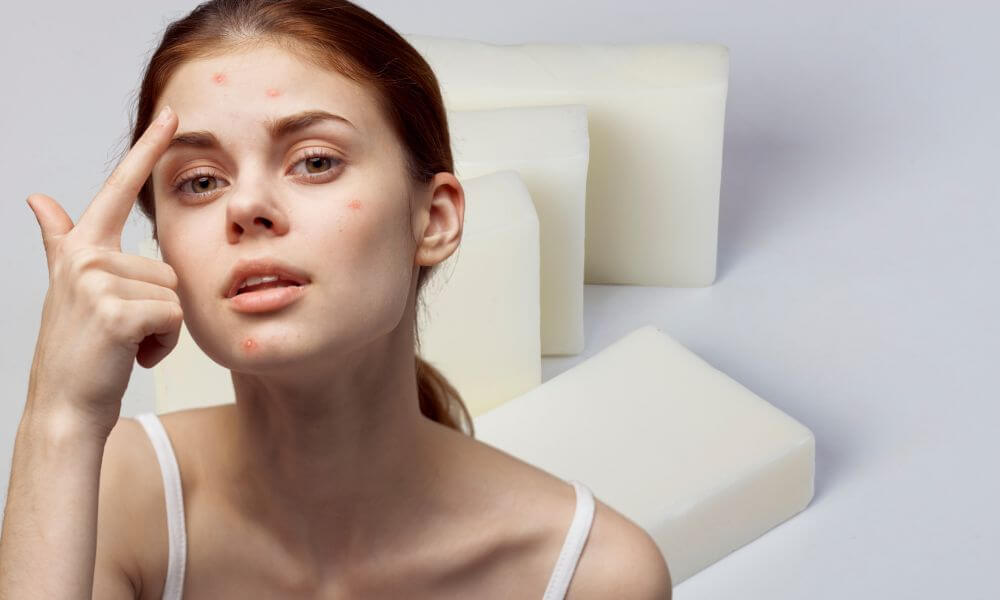So, if you’re having problems with acne while using goat milk soap, it could be for a couple of reasons.
It could be that you’re just starting out, and a flare-up is entirely normal in this case.
It could be that you have a problem with acne regardless, and goat milk soap just isn’t helping.
Let’s look further into this.

Is goat milk soap good for acne-prone skin?
Yes, it really is, in lots of ways.
I do just want to stress, though, that everyone has different skin care needs.
Different products work for different people and different skin types.
If you’re unsure of your skin type, speak to a dermatologist.
With that said, though, goat milk soap actually does have many benefits to acne-prone skin.
Firstly, the qualities of goat milk soap offer a really great exfoliant.
Some other soaps exfoliate your skin far too harshly, and this can exacerbate problems like acne.
Goat milk soap is much easier on the skin.
It also has antimicrobial properties, which can even eliminate acne altogether.
This would only be after considerable and consistent use, but the effects can be truly transformative for the right skin.
So, yes, it’s great for acne because the last thing you want is a harsh, abrasive product on the skin when you are already flaring up.
Goat milk is also packed with many nutrients which are also beneficial in the soap, like vitamins A, B, and C.
Is goat milk soap good for acne scars?
Acne scars are another question since they can take a bit longer to repair.
However, the fact is that goat milk soap, with consistent use, is going to be a great way of combatting the scars.
Depending on the depth and severity of the scar, goat milk soap can certainly only do so much.
It won’t necessarily rid you entirely of the scars.
That said, the Vitamin B in goat milk soap promotes cellular repair.
Thus, scars and spots are likely to disappear if it is consistently used.
Goat milk soap is also a natural antibacterial and antifungal agent, which is also really great for stopping things like acne from returning again once they have gone.
It’s really worth a try, and in conjunction with other treatments can be really effective against scars.
But can it irritate the skin?
Can goat milk soap irritate skin?
Though, as I’ve stressed, all skins are different, when it comes to goat milk soap, the likelihood that it will irritate your skin to any serious degree is quite low.
Since the main ingredient is milk and not any harsh or synthetic chemical, it’s far less irritating and more hypoallergenic than other kinds of soap.
Again, though, I would always recommend trying out a new product on a small area of skin before applying it to your whole face.
You never know how it might affect you.
Are there any other side effects?
Does goat milk soap have side effects?
Again, depending on your skin, it could.
No matter how certain you are that you’ll be fine, test it on a small spot first.
Some research has found that goat milk soap can trigger allergies, so it’s worth taking caution.
Other than that, though, it doesn’t really have any tangible or definite side effects.
But only you can know how exactly it works on your skin.
Which goat milk soap is best for acne?
So, with all of this said, which one is best for acne?
There are many brands.
The best one for our money is Purity goat milk soap.
It’s unscented and raw milk, making it very gentle for the skin and acne-prone areas.
Tea Tree goat milk soap is another great choice, this time with tea tree essential oils added.
It’s antibacterial and, most importantly, anti-fungal, so it’s really great for acne-prone skin.
Other choices include Calendula goat milk soap, infused with castor oil and calendula flowers.
Organic Castile goat milk soap is a similar brand, made with extra virgin oil. It doesn’t lather as well as others, but it’s really gentle.
So, for the right skin type, goat milk soap should be beneficial for acne troubles.
Don’t forget, though, that everyone’s skin is different, and everyone will react differently to different products.
Goat milk soap could be an extremely healthy and helpful substance for the right acne-prone skin, but on the other hand, it might not be right for you.
You should always start out by trying it on a small scale, and seeing how you react.
